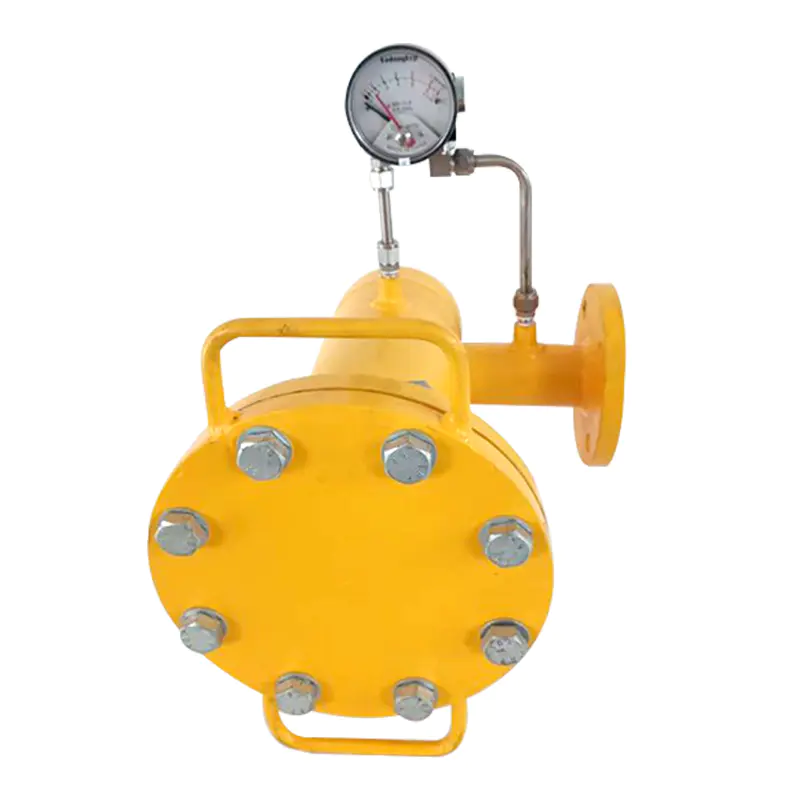Natural gas pressure regulator, gas pipeline pressure regulator
The natural gas pressure regulating valve and gas pipeline pressure regulator are important pipeline system devices, mainly used to adjust and control...
See Details1. Analysis of material properties
High temperature resistance:
LPG/natural gas/fuel gas filter with differential pressure gauge may be accompanied by high-temperature environments during transmission and use, so the selected materials must have good high-temperature resistance. For example, PTFE (polytetrafluoroethylene) is an ideal choice for high-temperature environments due to its excellent thermal stability and its ability to be used at temperatures up to 260°C for long periods of time. Glass fiber is also known for its excellent high temperature resistance and is suitable for high temperature and strong corrosive environments.
Chemical stability:
These gases may contain various chemical components, such as sulfides, moisture, etc., so the materials need to have excellent chemical stability to resist acid and alkali erosion. Both PTFE and fiberglass provide excellent resistance to a wide range of chemical media.
Filtration efficiency and breathability:
LPG/natural gas/fuel gas filter with differential pressure gauge needs to have high filtration efficiency while maintaining good air permeability to reduce system resistance. The PTFE-coated filter material achieves high-efficiency filtration through its microporous structure, and its surface is smooth and not easy to clog, helping to extend its service life. In addition, although small fibers such as PTFE fibers will increase air flow resistance, they have higher collection efficiency and need to be balanced and selected according to specific needs.
Wear resistance and strength:
During the gas flow process, LPG/natural gas/fuel gas filter with differential pressure gauge needs to withstand certain mechanical wear. Although polypropylene has good wear resistance, it is not suitable for high temperature environments; PTFE and glass fiber have both wear resistance and high strength, making them more suitable for such applications.
2. Structural design optimization
Multi-level, multi-level structure:
Designing the filter element into a multi-layered and multi-level structure can effectively enhance the filtration capacity and improve filtration efficiency. The materials of each layer can be matched according to their characteristics. For example, the outer layer is made of materials with good wear resistance, and the inner layer is made of materials with high filtration efficiency.
Reinforced support materials:
Adding reinforced support materials such as stainless steel and carbon fiber can not only improve the strength of the filter element, but also extend its service life. These materials have good mechanical properties and corrosion resistance, and can withstand the impact and wear caused by gas flow.
Cleaning channel design:
A cleaning channel is designed in the filter element structure to facilitate regular cleaning by users and prevent accumulation of dirt from affecting filtration efficiency. The design of cleaning channels should take into account ease of operation and convenience of cleaning.
3. Consideration of usage conditions
Temperature and Humidity Control:
High temperature will increase diffusion efficiency but increase gas viscosity, so the effect of temperature on filtration efficiency needs to be balanced. Excessive humidity may cause particles to penetrate the filter media more easily, so gas humidity needs to be properly controlled to improve the filtration effect.
Flow rate adjustment:
Properly adjusting the flow rate of fluid through the filter media can ensure efficient filtration without excessively increasing system resistance. If the flow rate is too fast, the filtration efficiency may decrease, while if the flow rate is too slow, the equipment volume and investment cost may increase.
4. Economic considerations
When selecting filter materials for LPG/natural gas/fuel gas filter with differential pressure gauge, cost-effectiveness also needs to be considered comprehensively. While high-performance materials such as PTFE and fiberglass may have a higher initial investment, their long-term stability and low maintenance costs may make the overall economics better. Therefore, trade-offs need to be made based on specific application scenarios and budget.
Improving the filtration efficiency of LPG/natural gas/fuel gas filters requires comprehensive consideration from many aspects such as material characteristics, structural design, usage conditions and economy. By selecting appropriate filter materials, optimizing structural design, reasonably controlling usage conditions and considering economic factors, the filtration efficiency and service life of the filter can be significantly improved.

Contact Us